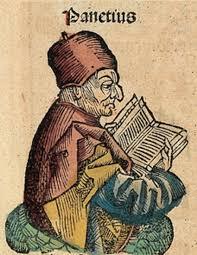
PANAITIOS HO RODOS is a Stoic philosopher. He is a pupil of Dioghenes ho Babylonios (Diogenes of Babylon also known as Diogenes of Seleucia). He is also a pupil of Antipatros ho Tarseus (Antipater of Tarsus) in Athens. Then he moves to Rome where he introduces Stoic doctrines to the city. Afterwards he returnes to the Stoic school in Athens and becomes the <scholarch>. Panaitios ho Rodos is the last head of the Stoics in Athens. With Panaitios, Stoicism becomes much more eclectic.
The principal work of Panaitios ho Rodos is “Peri tou Kathikodos” (“On Duties“). In this opus he elaborates on what is moral or immoral. He then discusses what is useful or not useful. At the end he debates the question of the apparent conflict between moral things and useful things. Being a Stoic, he could only consider that conflict as apparent and not as real. Anyway, the third investigation stays at the stage of project. His disciple Poseidonios (Posidonius of Apameia or of Rhodes) later seems to try and partially supply for it.
Marcus Tullius Cicero writes his own “De Officiis” (“On Duties“) in deliberate imitation of Panaitios ho Rodos and states that wants to complete what Panaitios had left untouched.
Panaitios mitigates the severity of the earlier Stoics. He gives the first place in philosophy to Physics, not to Logic. In Physics he dismisses the Stoic theory of the conflagration of the universe. He also tries to give a simpler division of the faculties of the soul. Moreover he doubts the reality of divination. In Ethics he accepts only a two-fold division of virtue, the theoretical and the practical, in contrast to the dianoetic and the ethical of Aristotle. He tries to bring the ultimate goal of life closer to natural impulses and to show the inseparability of the virtues.
Panaitios refuses the doctrine of apatheia and he sustains that some pleasurable sensations are in accordance with nature. He also affirms that moral definitions should be laid down in a simple way so to be understandable by whoever had not yet attained WISDOM. Panaitios ho Rodos is the last head of the Stoics in Athens.